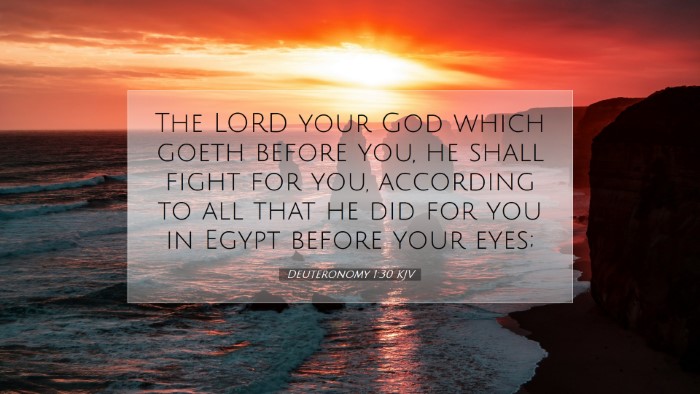Commentary on Deuteronomy 1:30
Verse: Deuteronomy 1:30 (KJV) - "The LORD your God, which goeth before you, he shall fight for you, according to all that he did for you in Egypt before your eyes."
Overview and Context
The book of Deuteronomy serves as a renewal of the covenant between God and the Israelites as they prepare to enter the Promised Land. It features a series of speeches by Moses, designed to remind the people of their relationship with God, the laws they are to follow, and the imminent challenges they face. Deuteronomy 1:30 specifically speaks to the assurance of God's providential care and his role as a divine warrior.
Commentary Insights
God's Assurance of Presence
Matthew Henry: This verse emphasizes the principle of divine guidance and warfare. Henry notes that it is God who leads his people; therefore, they should rest assured in His promises. The assurance that God will fight for them is a reminder of His past deliverance—especially during the Exodus from Egypt. The congregation learns that their battles are not fought alone, but rather with divine intervention.
Albert Barnes: Barnes elaborates on the theme of God's omnipotence and his covenant relationship with Israel. The idea that God goes before them implies that He scouts the land, removing obstacles and preparing the way. Furthermore, Barnes points out the significance of God's deeds "before your eyes," reminding Israel of the visible acts of salvation which serve as both a historical reference and an encouragement for future exploits.
Adam Clarke: Clarke emphasizes the continuity of God's support in various conflicts. He draws attention to God's past interventions, which serve as grounds for Israel's faith. The promise of God's fighting on their behalf is not merely a battle strategy but a theological assertion of His sovereignty and faithfulness. Clarke views this as a necessary reminder to the Israelites that their strength is not in numbers but in their relationship with God.
Theological Implications
Divine Providence and Human Responsibility
This verse encapsulates a significant theological truth: God’s sovereignty does not negate human responsibility. While God fights for Israel, the Israelites are still required to take action—namely, to enter the land and confront challenges. This reflects the dynamic interplay between divine grace and human effort.
The Role of Faith
The mandate to rely on God for victory reflects the importance of faith in the believer's life. This theme of trust deepens the understanding of what it means to follow God. The Israelites are called not only to recognize God's past actions but to live in anticipation of His future interventions. Such faith is crucial as they face unfamiliar terrain.
Practical Applications
For modern-day pastors, students, and theologians, this verse invites reflection on how they view God’s involvement in their lives. Here are some applications:
- Reinforcement of Faith: Encouraging congregants and students to look back on God's faithfulness in their own lives can fortify their current faith.
- Commitment to Action: While recognizing God's guidance, emphasis should also be given to the necessity of moving forward in faith, addressing obstacles with confidence.
- Understanding Divine Warfare: An exploration of what it means for God to fight for His people today, whether through spiritual warfare or physical struggles, is vital for a robust Christian life.
Conclusion
Deuteronomy 1:30 stands as a powerful reminder of God's unwavering support. This verse beautifully encapsulates the dual realities of divine intervention and human participation. For scholars and pastors alike, it prompts engagement with the overarching themes of trust, action, and the nature of God's faithfulness in both historical and contemporary contexts. Through these multinational insights offered by Matthew Henry, Albert Barnes, and Adam Clarke, the verse invites deeper study and understanding of how God operates in the lives of His people.


